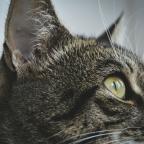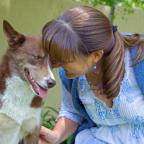
PDSA Weekly Pet Care Column: Vet Nurse shares spring safety advice for animal lovers
Springtime has sprung, and with the new time of year comes seasonal dangers. Pet owners have been told to keep an eye on their pets, with PDSA Vet Nurse Nina Downing sharing spring safety messages and advice.
Nina says: "Many of us will be pleased the winter gloom is on the way out, and both flowers blooming and more daylight hours are back.
"Whilst enjoying the new season, it's important for animal lovers to watch out for certain dangers that spring brings.
Tick season
"Most active in warmer months, ticks will begin to make an appearance in spring. They are parasites that embed their heads under the skin and feed on animal or human blood. Safety concerns are because of the diseases they may carry, which include Lyme disease, Anaplasmosis, Babesiosis and tick-borne encephalitis, which can make people and pets very poorly, in extreme cases, in those with a poor immune system these, can be fatal.
"Ticks are commonly found in long grass, woodlands, and areas with lots of sheep or wildlife, so be mindful when heading out for dog walks. Be sure that your dog is up to date with their flea and tick treatment as this will give them some protection as any ticks that latch on should be weakened or killed if you don't find them for a while.
"Check your dog for ticks after walks, as well as checking your cat if your feline friend is a bit of an adventurer - you may find a tick before it has had the chance to attach. They are commonly found on your pet's head, ears, around eyes, armpits, groin and tummy, but you want to give your pet a complete check over just in case. If you find a tick on your pet, it is important to remove it quickly and properly with a tick removing tool.
Poisonous Spring plants
"As temperatures rise, we begin to see spring bulbs bloom. Many beautiful common plants, such as snowdrops, daffodils and tulips are toxic to pets and can lead to them becoming unwell if they eat them.
"Bulbs often have a higher concentration of nutrients than leaves or flowers, so can be even more dangerous for your pet. When gardening, keep your pets away from toxic plants and call your vet straight away if you think your pet has chewed or swallowed any part of it.
Watch out, bees about
"With more flowers blossoming, bumblebees will also make more of an appearance in your garden, so keep your pets away from bees buzzing around to avoid any painful stings. This is when teaching your pet a simple 'leave' command can come in handy!
Countryside walks
"The warmer weather makes longer walks even more appealing. When venturing out into the countryside look out for farm animals, especially those with young lambs, calves or hens with chicks. Keep your dog on a short lead when entering fields to prevent injury and stress to farm animals or your four-legged friend.
New homes for old things this Spring
"Whilst looking after your pets this spring, why not indulge in a form of self-care to look after yourself and have a spring clear out. If you find yourself every morning wading through clothes in your wardrobe, you can't even remember you own, perhaps it's time for a spring clean!
"Your unwanted goods can help save pet's lives – the donated items sold in PDSA's charity shops raise vital funds to provide vet care to pets in need. Should a pet have a springtime emergency and need life-saving help, your spring clear out could contribute to saving that pet's life."







